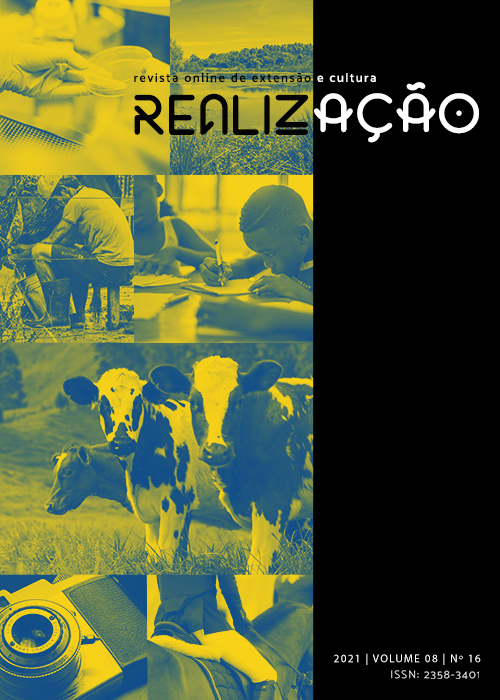Conciencia fonológica en la educación infantil: un análisis de las prácticas pedagógicas
DOI:
https://doi.org/10.30612/realizacao.v8i16.15105Palabras clave:
Intervenção Pedagógica. Habilidades. Crianças.Resumen
El artículo presenta una investigación cuyo objetivo fue analizar y reflexionar sobre el desarrollo de la conciencia fonológica -la capacidad que tenemos para manipular los sonidos de nuestra lengua/capacidad de darnos cuenta de que una palabra puede empezar o terminar con el mismo sonido- y cómo ocurre esto. proceso en la práctica pedagógica con niños pequeños en Educación Infantil. Se realizaron estudios bibliográficos sobre el tema Conciencia Fonológica, así como investigaciones empíricas en clases de Educación Infantil en una institución educativa de la ciudad de Dourados/MS. La investigación se desarrolló con base en un enfoque cualitativo, exploratorio. Se encontró que la preocupación por desarrollar la conciencia fonológica en los niños estuvo presente mediante la realización de actividades de forma lúdica y con la participación de los niños, así como lo fundamental que es mejorar dichas habilidades para beneficiar y facilitar el proceso de adquisición de la lectura. y la escritura en los niños, especialmente cuando inician su aprendizaje escolar. También se concluye que el docente necesita capacitarse para comprender la importancia, necesidad y conocimiento sobre estos procesos, apuntando a crear posibilidades y experiencias que lleven a los niños a desarrollar sus potencialidades, conduciéndolos plenamente a la adquisición del lenguaje hablado, escrito, como así como lectura e interpretación.
Descargas
Citas
ADAMS, M.; FOORMAN, B.; LUNDBERG, I.; BEELER, T. Consciência fonológica em crianças pequenas. Porto Alegre: Artmed, 2006.
BIMONTI, Rafaela de Paula. A importância da consciência fonológica na educação infantil. São Paulo, v.1, 2008.
BORGATTO, Ana Maria Trinconi; BERTIN, Terezinha; MARCHEZI, Vera. Ápis – Letramento e Alfabetização. 2. ed. São Paulo: Ática, 2014.
BRASIL. Lei nº 8.069. Estatuto da Criança e do Adolescente. Brasília, 1990. Disponível em: <https://www.gov.br/mdh/pt-br/centrais-de-conteudo/crianca-e-adolescente/estatuto-da-crianca-e-do-adolescente-versao-2019.pdf> Acesso em: 05 abr. 2021.
BRASIL. MINISTÉRIO DE EDUCAÇÃO. SECRETARIA DE EDUCAÇÃO BÁSICA. Brinquedos e brincadeiras nas creches: manual de orientação pedagógica. Elaboração do texto final Tizuko Kishimoto e Adriana Freyberger. Ilustrações de Luis Augusto Gouveia. Brasília: MEC/SEV, 2012. Disponível em: < http://portal.mec.gov.br/dmdocuments/publicacao_brinquedo_e_brincadeiras_completa.pdf> Acesso em: 07 abr. 2021.
CAPOVILLA, A.G.S, & CAPOVILLA, F.C. Treino de consciência fonológica de pré a segunda série: efeitos sobre habilidades fonológicas, leitura e escrita. Temas sobre Desenvolvimento, 1998; 7(40), 5-15.
FERREIRO, Emilia. Com todas as letras. São Paulo: Cortez, 1993.
FERREIRO, Emilia; TEBEROSKY, Ana. Psicogênese da língua escrita. Porto Alegre: Artes Médicas, 1985.
GIL, Antônio Carlos. Métodos e técnicas de pesquisa social. 5. ed. São Paulo: Atlas, 1999.
KISHIMOTO, Tizuko M. Brinquedos e brincadeiras na Educação Infantil. ANAIS DO I SEMINÁRIO NACIONAL: CURRÍCULO EM MOVIMENTO – Perspectivas Atuais. Belo Horizonte, novembro de 2010.
LAKATOS, Eva Maria, MARCONI, Maria de Andrade. Fundamentos de metodologia científica. 5. ed. São Paulo: Atlas, 2003.
MAGDA, Soares. Alfabetização: a questão dos métodos. São Paulo: contexto, 2016.
MORAIS, Artur Gomes de. Consciência fonológica na educação infantil e no ciclo de alfabetização. 1. ed. Belo Horizonte: Autêntica, 2019.
MORAIS, Artur Gomes de. Sistema da escrita alfabética. São Paulo: Melhoramento, 2012.
MORAIS, Artur Gomes de. O desenvolvimento da consciência fonológica e a apropriação da escrita alfabética entre crianças brasileiras. Revista Brasileira de Alfabetização. Vitória: v. 1, n. 1, p. 59 – 76, jan./jun. 2015.
SMOLKA, Ana Luiza Bustamante. A criança na fase inicial da escrita: a alfabetização como processo discursivo. São Paulo: Cortez, 1993.
Descargas
Publicado
Cómo citar
Número
Sección
Licencia
Derechos de autor 2022 Andreína de Melo Louveira Arteman, Priscila Demeneghi da Silva Vargas

Esta obra está bajo una licencia internacional Creative Commons Atribución-NoComercial-CompartirIgual 4.0.
Autores que publicam nesta revista aceitam as normas de publicação, bem como, concordam com os seguintes termos:
(a) O Conselho Editorial se reserva ao direito de efetuar, nos originais, alterações da Língua portuguesa para se manter o padrão culto da língua, respeitando, porém, o estilo dos autores.
(b) Autores mantêm os direitos autorais e concedem à revista o direito de primeira publicação, com o trabalho simultaneamente licenciado sob a Creative Commons Atribuição-NãoComercial-CompartilhaIgual 4.0 Internacional que permite: Compartilhar — copiar e redistribuir o material em qualquer suporte ou formato e Adaptar — remixar, transformar, e criar a partir do material. A Creative Commons Atribuição-NãoComercial-CompartilhaIgual 4.0 Internacional considera os termos seguintes:
- Atribuição — Você deve dar o crédito apropriado, prover um link para a licença e indicar se mudanças foram feitas. Você deve fazê-lo em qualquer circunstância razoável, mas de nenhuma maneira que sugira que o licenciante apoia você ou o seu uso.
- NãoComercial — Você não pode usar o material para fins comerciais.
- CompartilhaIgual — Se você remixar, transformar, ou criar a partir do material, tem de distribuir as suas contribuições sob a mesma licença que o original.
- Sem restrições adicionais — Você não pode aplicar termos jurídicos ou medidas de caráter tecnológico que restrinjam legalmente outros de fazerem algo que a licença permita.


